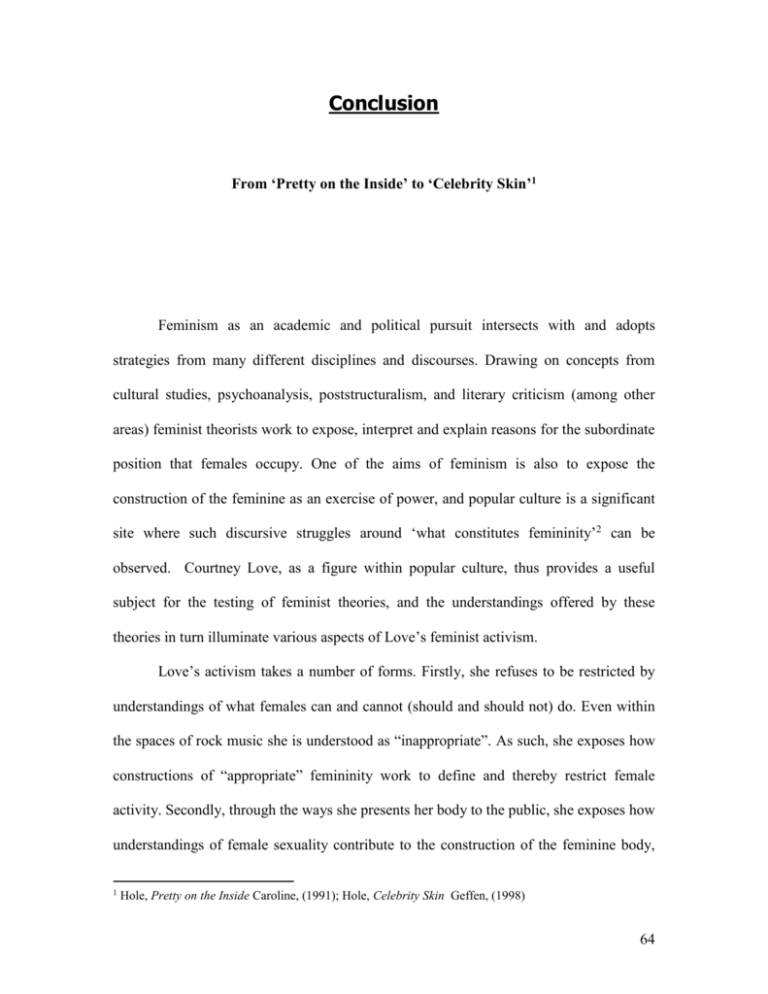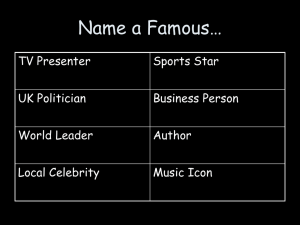Conclusion
advertisement

Conclusion
From ‘Pretty on the Inside’ to ‘Celebrity Skin’1
Feminism as an academic and political pursuit intersects with and adopts
strategies from many different disciplines and discourses. Drawing on concepts from
cultural studies, psychoanalysis, poststructuralism, and literary criticism (among other
areas) feminist theorists work to expose, interpret and explain reasons for the subordinate
position that females occupy. One of the aims of feminism is also to expose the
construction of the feminine as an exercise of power, and popular culture is a significant
site where such discursive struggles around ‘what constitutes femininity’2 can be
observed. Courtney Love, as a figure within popular culture, thus provides a useful
subject for the testing of feminist theories, and the understandings offered by these
theories in turn illuminate various aspects of Love’s feminist activism.
Love’s activism takes a number of forms. Firstly, she refuses to be restricted by
understandings of what females can and cannot (should and should not) do. Even within
the spaces of rock music she is understood as “inappropriate”. As such, she exposes how
constructions of “appropriate” femininity work to define and thereby restrict female
activity. Secondly, through the ways she presents her body to the public, she exposes how
understandings of female sexuality contribute to the construction of the feminine body,
1
Hole, Pretty on the Inside Caroline, (1991); Hole, Celebrity Skin Geffen, (1998)
64
thereby suggesting how sexuality operates as a form of power over females. Thirdly, by
using clothing and make-up “incorrectly” in the production of her kinderwhore look, she
exposes femininity as a performance. She thereby teaches girls to be aware of what they
are representing through their appearance, and offers a strategy for gender subversion.
Love thus exposes the regulatory power of cultural norms in feminine performance.
Finally, Love believes that changing understandings of girls is an important strategy in
changing how girls themselves and Western culture as a whole, values females. Thus, in
addition to exposing and subverting the means by which girls are subordinated, Love,
through her lyrics, also aims to produce new, empowered subjectivities for girls.
Love’s various forms of feminist activism are involved in exposing how
constructions of the feminine are forms of contemporary power which work to support
the existing power relationship between males and females in Western culture – a
relationship which naturalizes (and justifies) the subordinate position females occupy.
Love thus presents a feminist challenge to the status quo, and has, consequently, been
“punished” for her deviance – particularly through unfavorable media representations.
However, while such media attention was intended to demonize her, in effect, it widened
her scope for subversion, because Love’s gender deviancy was reproduced for the public
to see. The attacks on Love were interpreted by many girls as acts of female power. As
one fan put it ‘she’s been through hell and she’s survived.’3
Much of the focus of this study has been on Love during the early / mid 1990s.
Since then, she has undergone what has been described as a “Hollywood makeover”.
Many accusations have been leveled at Love for this “transformation”. Her ability to
2
Angela McRobbie, Postmodernism and Popular Culture (London; New York, 1994) p. 158.
3
65
“rock” has been queried: she was asked, ‘But can you really be a rebel in a Versace
gown?’4 Love replied, yelling, ‘Yeah. Who said you can’t? A bunch of fucking guys in
denim! Fuck them! No women said this. But then you’re putting this idea of redundancy
into rock like there’s some rule.’5
These accusations questioned Love’s feminist significance, as she was adopting
more traditional feminine ideals {those that have been critiqued by feminists and herself).
However, while in the past Love has used her body to expose the operation of
“disciplinary power”, and the consequences of this on the female body; she now offers a
different strategy of resistance for girls. She suggests health and fitness – a celebration of
the female body. Love’s version of this creed, however, differs from the majority of other
“starlets” who advocate this kind of body image. Rather than aerobics, or similar forms of
“female” exercise, Love advocates playing team sports such as soccer, sports that
encourage competitiveness and “strength” in girls.6
Kylie Murphy confronts the attacks on Love:
Courtney Love is a loud, angry woman who takes up space. It is of course appalling that
women are expected to be pretty if they are to be successful. The fact that women’s
discursive power is dependent on their compliance to particular regimes of beauty
requires a feminist solution. However, while mounting a feminist attack on the visual
conformity demanded of women … it is important that feminism does not acquire a new
orthodoxy. Feminism must remain committed to being inclusive of difference. It is not the
place of feminism to join the chorus of voices that tell women the correct way to dress,
groom and make themselves up.7
4
5
Michele Manelis, ‘The Hole Truth’, Juice (Sept. 1998) p. 56.
Ibid.
6
Kylie Murphy, ‘“I’m Sorry – I’m Not Really Sorry”: Courtney Love and Notions of Authenticity’,
Hecate: An Interdisciplinary Journal of Women’s Liberation 27:4 (2001) p. 159.
7
66
Love of course was “successful” before her “make over”. However, in changing
her image, she was granted access to the world of Hollywood film.8 As Murphy points
out, ‘Love’s physical transformation demonstrates a disciplined mobilization of bodily
surfaces. She is knowingly altering her appearance so as to provide herself with more
economic power.’9 Attaining economic power is a laudable achievement for a female. As
Murphy reminds us, ‘feminism demands equal wages for equal work, it wants women to
have a “room of their own” and be financially independent, but it still struggles to
encourage women who reach these goals. Love’s vilification as a bitch is a caution to
feminism not to despise blonde ambition.’10
Love clearly articulates her current position within Western culture, while
explaining to journalist Philip Weiss a “vision” she had had. After listening to lectures
‘about the grace of the divine mother’ she protested, ‘what about the divine whore …
what about the woman who is the keeper of everybody else’s sexuality? She maybe
doesn’t make the sons, but she keeps the sons, OK?’11 She continues,
So in my vision there were these gates as the end of an arc, … like a Roman
arch of triumph, and I’m going through these gates on a stallion, or in my
case, a mare. So as I’m going through the gates I see by the side of the road
this exquisite house. And I’m thinking the divine whore is the person who’s
never allowed through the gates. She has to live in the nicest house in the
town outside the gates. You can’t even see her trophies, because her trophies
have been covered up by the trophies and inheritances of other people. And
all she does is covert men’s power. And I realized, I don’t live in that house
anymore.12
8
9
Murphy, Op. Cit. p. 153.
Ibid. p. 159.
11
Philip Weiss, ‘Love and Other Catastrophes’, Face (Nov. 1998) At www.hole.com/articles/face98.html
Accessed 26/04/02.
12
Ibid.
10
67









